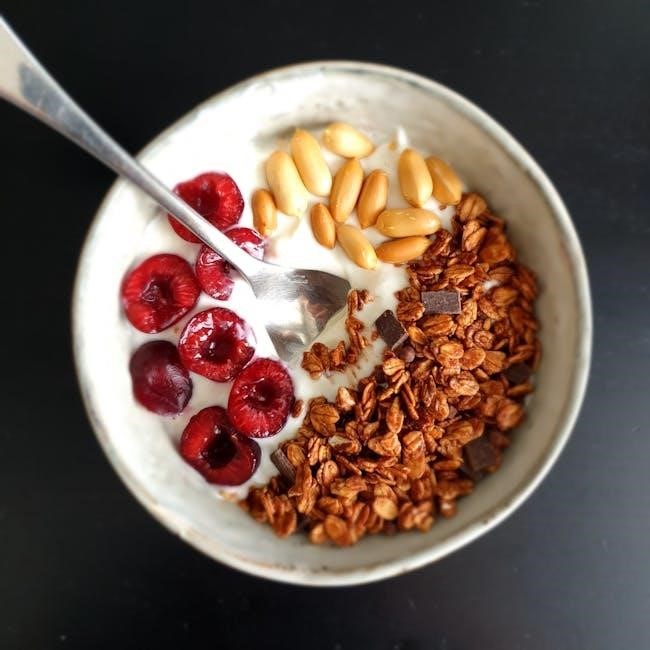lupus diet meal plan pdf
Lupus is a chronic autoimmune disease affecting multiple body systems. Diet plays a crucial role in managing symptoms‚ reducing inflammation‚ and improving overall well-being. A balanced‚ anti-inflammatory diet rich in antioxidants can help alleviate discomfort and prevent flares‚ while avoiding triggers like sugary and fatty foods is essential for maintaining health.
1.1 Understanding Lupus and Its Impact on Health
Lupus‚ or systemic lupus erythematosus (SLE)‚ is a chronic autoimmune disease that can affect multiple body systems‚ including the skin‚ joints‚ kidneys‚ and brain. It causes widespread inflammation and can lead to fatigue‚ pain‚ and organ damage. Managing the condition often requires a holistic approach‚ with diet playing a key role in reducing inflammation and improving overall health outcomes.
1.2 The Role of Diet in Managing Lupus Symptoms
Diet plays a cornerstone role in managing lupus symptoms by reducing inflammation and preventing flares. Anti-inflammatory and antioxidant-rich foods‚ such as fruits‚ vegetables‚ whole grains‚ and lean proteins‚ help alleviate discomfort. Avoiding triggers like alfalfa‚ sugary‚ and fatty foods is crucial. A tailored diet can significantly improve quality of life and support overall health for those with lupus.
Key Principles of a Lupus-Friendly Diet
A lupus-friendly diet emphasizes balanced nutrition‚ focusing on anti-inflammatory and antioxidant-rich foods. It avoids triggers like sugary and fatty foods‚ promoting overall health and symptom relief.
2.1 Focus on Anti-Inflammatory Foods
Incorporating anti-inflammatory foods is vital for managing lupus symptoms. Fatty fish like salmon‚ whole grains‚ and leafy greens help reduce inflammation. These foods support immune balance and overall health‚ aiding in symptom relief and disease management.
2.2 Incorporating Antioxidant-Rich Foods
Incorporating antioxidant-rich foods is essential for managing lupus‚ as they combat oxidative stress and inflammation. Berries‚ leafy greens‚ and other fruits are excellent sources. These nutrients help protect cells from damage‚ reduce inflammation‚ and support overall health‚ making them a cornerstone of a lupus-friendly diet.
2.3 Avoiding Triggers and Inflammatory Foods
Identifying and avoiding inflammatory foods is critical for lupus management. Sugary‚ fatty‚ and processed foods can trigger flares‚ while alfalfa and high-sodium foods may worsen symptoms. Limiting these and focusing on whole‚ nutrient-dense options helps reduce inflammation and supports overall well-being‚ promoting a healthier lifestyle for those with lupus.

Sample 7-Day Lupus Diet Meal Plan
A 7-day lupus-friendly meal plan includes balanced breakfasts‚ lunches‚ dinners‚ and snacks‚ focusing on anti-inflammatory and antioxidant-rich foods to help manage symptoms effectively.
3.1 Breakfast‚ Snack‚ Lunch‚ and Dinner Options
Start with oatmeal topped with berries and nuts for breakfast. Snack on fruits or yogurt. Lunch could feature grilled chicken or fish with steamed vegetables and quinoa. Dinner might include salmon or turkey with roasted veggies and brown rice; Portion sizes vary‚ but focus on balanced‚ nutrient-rich meals to support overall health and manage lupus symptoms effectively.
3.2 Adjusting Portion Sizes and Ingredients
Adjust portion sizes based on individual needs and activity levels. Swap refined grains for whole grains and incorporate lean proteins like chicken or fish. Replace sugary snacks with fruits or nuts. Tailor ingredients to avoid triggers‚ ensuring meals are anti-inflammatory and nutrient-dense to support health and manage lupus effectively while keeping flavors vibrant and satisfying.

The Mediterranean Diet for Lupus
The Mediterranean diet emphasizes fruits‚ vegetables‚ whole grains‚ lean proteins‚ and healthy fats‚ reducing inflammation and promoting antioxidant intake‚ which aligns well with lupus management goals.
4.1 Benefits of the Mediterranean Diet
The Mediterranean diet offers numerous benefits for lupus management‚ including reduced inflammation‚ improved heart health‚ and enhanced antioxidant intake. Its focus on whole‚ unprocessed foods supports immune function and overall well-being‚ making it a sustainable and effective choice for managing lupus symptoms and promoting long-term health.
4.2 Sample Mediterranean-Style Meal Ideas
Start with breakfast options like oatmeal topped with berries and walnuts or Greek yogurt with honey. Lunches could include grilled fish with quinoa and steamed vegetables or a hearty salad with olive oil dressing. Dinners might feature roasted chicken with herbs‚ brown rice‚ and sautéed spinach. Snacks include mixed nuts‚ fresh fruits‚ or carrot sticks with hummus‚ aligning with lupus-friendly‚ anti-inflammatory choices.
The DASH Eating Plan for Lupus Management
The DASH Eating Plan emphasizes vegetables‚ fruits‚ whole grains‚ lean proteins‚ and low-fat dairy‚ reducing sweets and sugary foods to help manage lupus symptoms effectively.
5.1 Overview of the DASH Diet
The DASH (Dietary Approaches to Stop Hypertension) diet focuses on whole grains‚ fruits‚ vegetables‚ lean proteins‚ and low-fat dairy‚ while minimizing sugary and processed foods. It aids in lowering blood pressure and improving heart health‚ aligning with lupus management by reducing inflammation and promoting overall well-being through balanced nutrition.
5.2 How DASH Aligns with Lupus Dietary Needs
The DASH diet aligns with lupus dietary needs by emphasizing anti-inflammatory foods‚ whole grains‚ and lean proteins‚ which help reduce inflammation and manage symptoms. Its focus on antioxidants and fiber-rich foods supports immune health‚ while avoiding processed and high-sodium foods aids in maintaining overall well-being‚ making it a suitable choice for those managing lupus.
Food Recommendations for Lupus
A lupus-friendly diet emphasizes anti-inflammatory foods‚ antioxidants‚ and balanced nutrition to manage symptoms. Focus on whole grains‚ lean proteins‚ and fresh produce to support overall health and well-being.
6.1 Best Foods to Include in Your Diet
Include anti-inflammatory and antioxidant-rich foods like fatty fish‚ whole grains‚ lean proteins‚ and colorful fruits and vegetables. Omega-3 sources‚ such as salmon and flaxseeds‚ reduce inflammation. Nuts‚ seeds‚ and avocados provide healthy fats. Berries‚ leafy greens‚ and citrus fruits boost antioxidants‚ supporting immune health and reducing lupus flare-ups. These foods promote overall well-being and symptom management.
6.2 Foods to Avoid or Limit
Limit sugary‚ fatty‚ and processed foods that trigger inflammation. Avoid alfalfa due to its potential to cause flares. Reduce intake of red meat‚ refined carbohydrates‚ and saturated fats‚ which can worsen symptoms. Excessive alcohol and caffeine should also be avoided. These dietary adjustments help minimize inflammation and support symptom management for those with lupus.

The Role of Omega-3 Fatty Acids
Omega-3 fatty acids reduce inflammation‚ benefiting lupus management. Found in fatty fish‚ flaxseeds‚ and walnuts‚ they support heart health and may ease symptoms‚ aiding overall well-being.
7.1 Sources of Omega-3s and Their Benefits
Omega-3 fatty acids are essential for reducing inflammation and supporting heart health. Primary sources include fatty fish like salmon‚ mackerel‚ and sardines‚ as well as flaxseeds‚ walnuts‚ and chia seeds. These nutrients help alleviate lupus symptoms by minimizing inflammation and promoting overall well-being‚ making them a crucial component of a lupus-friendly diet.
7.2 Tips for Incorporating Omega-3s into Meals
Incorporate omega-3s by adding fatty fish like salmon or mackerel to meals twice a week. Sprinkle flaxseeds or chia seeds on oatmeal or yogurt. Use walnuts or almonds in salads or as snacks. Substitute olive oil with flaxseed oil in dressings. These small changes can enhance your lupus diet and provide anti-inflammatory benefits naturally.
Foods That May Trigger Lupus Flares
Certain foods like alfalfa‚ sugary‚ and fatty foods may trigger lupus flares by increasing inflammation. Avoiding these can help manage symptoms and reduce disease activity effectively.
8.1 Alfalfa and Its Potential Risks
Alfalfa contains L-canavanine‚ an amino acid linked to lupus-like symptoms and flares. Consuming alfalfa supplements or sprouts may activate the immune system‚ worsening inflammation. Patients are advised to avoid alfalfa products to prevent triggering disease activity and manage symptoms effectively. Consulting a healthcare provider is crucial before adding any herbal supplements to the diet.
8.2 Sugary and Fatty Foods to Limit
Sugary and fatty foods can exacerbate lupus symptoms by promoting inflammation and weight gain. Limiting intake of soft drinks‚ pastries‚ fried foods‚ and processed snacks is recommended. These foods can trigger flares and hinder overall health. Opting for nutrient-dense‚ anti-inflammatory choices supports better symptom management and improves quality of life for lupus patients.

Importance of Consulting a Healthcare Provider
Consulting a healthcare provider ensures personalized dietary plans tailored to individual needs‚ optimizing symptom management and overall health outcomes for lupus patients.
9.1 Personalizing Your Lupus Diet Plan
A personalized lupus diet plan considers individual health needs‚ allergies‚ and lifestyle. Consulting a healthcare provider ensures tailored recommendations‚ balancing nutrition and symptom management to improve overall well-being and reduce flare risks effectively.
9.2 Regular Follow-Up and Adjustments
Regular follow-ups with healthcare providers ensure the lupus diet plan remains effective. Adjustments are made based on symptom changes‚ new allergies‚ or shifts in health goals‚ promoting long-term management and improved quality of life through continuous‚ personalized care and dietary fine-tuning.
28-Day Mediterranean Lupus Diet Plan
This 4-week Mediterranean-style plan offers structured meal ideas‚ recipes‚ and shopping lists to support lupus management; It promotes balanced eating and sustainable health benefits.
10.1 Structure and Benefits of the 4-Week Plan
The 28-day Mediterranean plan provides a detailed framework with daily meal ideas‚ portion guides‚ and recipes. It emphasizes anti-inflammatory and antioxidant-rich foods‚ promoting reduced inflammation and improved symptoms. The structured approach minimizes cooking time with leftovers‚ offering convenience and variety. This plan supports overall health and sustainability‚ tailored to lupus dietary needs for long-term well-being.
10.2 Sample Recipes and Shopping Lists
Discover delicious‚ lupus-friendly recipes like lemon-herb salmon‚ quinoa salads‚ and roasted vegetable stir-fries. Each recipe includes ingredient lists and step-by-step instructions. Shopping lists are organized by category‚ featuring items like fatty fish‚ whole grains‚ and colorful vegetables. These resources simplify meal prep‚ ensuring a balanced and flavorful diet that aligns with lupus management goals.
The Role of Nutrition in Managing Lupus
Nutrition is vital in managing lupus‚ as a balanced diet rich in antioxidants and anti-inflammatory foods supports gut health‚ reduces inflammation‚ and alleviates symptoms effectively.
11.1 Eating a Balanced and Diverse Diet
Eating a balanced and diverse diet is essential for managing lupus. Focus on fresh fruits‚ vegetables‚ whole grains‚ and lean proteins to ensure a wide range of nutrients. Avoid sugary and fatty foods that can trigger inflammation. Incorporate antioxidants and omega-3 fatty acids to support immune health and reduce disease activity. A varied diet helps maintain energy levels and overall well-being.
11.2 Supporting Gut Health Through Diet
Maintaining gut health is crucial for overall well-being‚ especially for those with lupus. A diet rich in whole grains‚ fruits‚ vegetables‚ and lean proteins supports a healthy gut. Include fermented foods like yogurt and sauerkraut to boost beneficial bacteria. Avoid processed and sugary foods that can disrupt gut balance. Staying hydrated aids digestion and overall gut function.
A lupus-friendly diet focuses on anti-inflammatory‚ antioxidant-rich foods‚ avoiding triggers. Plans like the Mediterranean and DASH diets are recommended. Consult a healthcare provider for personalized advice and sustainable changes.
12.1 Summary of Key Dietary Recommendations
A lupus-friendly diet emphasizes anti-inflammatory and antioxidant-rich foods like fruits‚ vegetables‚ and omega-3 sources. Avoid triggers such as alfalfa‚ sugary‚ and fatty foods. Incorporate whole grains‚ lean proteins‚ and healthy fats. Consider Mediterranean and DASH diets for structured plans. Stay hydrated‚ limit alcohol‚ and consult a healthcare provider for personalized adjustments to manage symptoms effectively and support overall well-being.
12.2 Encouragement for Sustainable Lifestyle Changes
Adopting a lupus-friendly diet is a powerful step toward managing symptoms and enhancing quality of life. By focusing on nutrient-dense‚ anti-inflammatory foods and avoiding triggers‚ individuals can reduce flares and improve overall health. Consistency and patience are key; small‚ gradual changes lead to sustainable results. Regularly consulting a healthcare provider ensures personalized adjustments‚ fostering long-term well-being and empowering individuals to thrive with lupus.